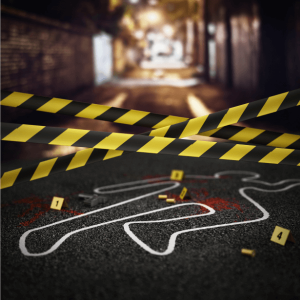 Any loss of life is a tragedy. Under civil laws in Chicago and across Illinois, when a death occurs due to the negligence or mistake of another (such as an unfortunate car accident), one party can be sued by the other for money damages. But from the earliest beginnings of civilization, societies have established other penalties and punishments to deal with those that take the life of another intentionally or recklessly. As early as 450 B.C., Roman law known as the “Twelve Tables” stated that “…(i)f a man has broken the limb of another man, unless he makes peace with him, there shall be for like….”. This concept, also known as “lex talionis”, stood for the proposition that the penalty should be “an eye for an eye”, meaning that the penalty for a wrong committed against another should be equal in severity.
Any loss of life is a tragedy. Under civil laws in Chicago and across Illinois, when a death occurs due to the negligence or mistake of another (such as an unfortunate car accident), one party can be sued by the other for money damages. But from the earliest beginnings of civilization, societies have established other penalties and punishments to deal with those that take the life of another intentionally or recklessly. As early as 450 B.C., Roman law known as the “Twelve Tables” stated that “…(i)f a man has broken the limb of another man, unless he makes peace with him, there shall be for like….”. This concept, also known as “lex talionis”, stood for the proposition that the penalty should be “an eye for an eye”, meaning that the penalty for a wrong committed against another should be equal in severity.
When dealing with the death of another, this ancient idea demanded that the offender be put to death as punishment and has been carried into law until the present day by way of death penalty by firing squad, poison, lethal injection, or the electric chair. But since 2011, after a moratorium on capital punishment was put into place that year, a conviction for first-degree murder in Illinois no longer puts a convicted defendant in jeopardy of death by electrocution. In Chicago, or more specifically Cook County, one of the last electrocutions occurred in 1962 for the murder of a Chicago Police Detective which had occurred in 1956. Many other states however still have active death penalty statutes.
If you have been accused of murder, manslaughter, or reckless homicide, the Chicago criminal defense attorneys of Mitchell S. Sexner & Associates LLC can help you fight the charges you are facing. Contact us at (312) 644-0444 for a free consultation.
Intentional vs. Unintentional Acts
This difference between intentional, unintentional, reckless and negligent acts will typically mean the difference between a prison sentence vs a civil lawsuit for mere money damages only. That’s because the law doesn’t intend to punish citizens who make honest (although negligent) errors, because everyone makes mistakes. No one should go to jail for just making a mistake. People cross out of their driving lanes on the highway, fail to signal, and follow too closely all around us and every day. When an accident results though, it’s not likely that such a driver will see a single day in jail however, whether the accident was minor or even fatal. That’s because although the driver may not be world’s best driver (he or she may have been distracted, a new driver, or just not very skilled), that person didn’t do anything intentionally. They made a mistake, even if death resulted. That’s entirely different than a driver who makes a mistake and a death occurs while driving recklessly or under the influence of alcohol or drugs. In those cases, the driver will likely be charged with Reckless Homicide and is discussed further below.

Homicide
Homicide is a general term that relates to the killing of one human being by another. Such an event may or may not be a crime, depending upon the circumstances. For example, soldiers kill others in battle without it being considered a crime. Other times, a person may kill another in self-defense or as a result of a pure accident that was not his or her intention or fault. But the broad term homicide also encompasses those circumstances for which a person does intend to kill another or acts with such reckless disregard for the safety of others that a death results; these are crimes that are referred to as murder and manslaughter.
Murder
In Illinois, our statutes differentiate murder between those in the “First Degree” and those in the “Second Degree”, with each type of murder charge setting forth different standards and penalties as follows:
First Degree Murder
This refers to a homicide that occurs without legal justification if any of the following is true at the time that the offender commits the act. He or she:
- Intends to commit great bodily harm
- Intends to kill
- Knows that the act being committed will cause the death of another
- Knows that the act being committed creates a strong possibility that great bodily harm or death may come to another
- Intends to commit a “forcible felony” (other than Second Degree Murder)
Even though Illinois has a moratorium on the death penalty and presently no one is being put to death, those found guilty of First Degree Murder may still technically be sentenced to death if any of the following aggravating factors are present under certain additional circumstances, including but not limited to:
- Victim was a police officer or fireman
- Victim was a correctional officer or an inmate at a jail or prison
- Two or more victims murdered intentionally
- Murder the result of a hijacking of bus, train, plane or other public transportation mode
- Murder for hire
- Killed during course of another inherently violent crime such as an armed robbery, predatory criminal sexual assault, residential burglary, aggravated stalking or home invasion
- Victim was under 12 years old and death the result of exceptionally heinous or brutal cruel behavior
- Murder intended to prevent the victim from testifying or participating in a criminal prosecution or investigation
- Death occurred during commission of certain statutory crimes including some under the Illinois Controlled
- Substances Act
- While incarcerated, and while committing a felony, caused or participated in the intentional killing of another
- Murder was the result of a calculated, cold and premeditated plan
- Victim was an emergency medical technician, ambulance driver, paramedic, or similar vocation killed performing his/her duties
- Offender was the leader or administrator of a calculated criminal conspiracy and ordered or participated in the murder
- Murder was intentional and torture was involved
- Firearm intentionally discharged from a car and victim was outside of car
- Victim was over 60 years old and death the result of exceptionally heinous or brutal cruel behavior
- Victim with a disability
- Committed to interfere with the work of the victim’s voluntary community policing
- Victim was protected by an Order of Protection issued under the Illinois Domestic Violence Act of 1986
- Victim was a teacher or school employee on or near school grounds
- Murder in connection with terrorism
Second Degree Murder
But since not all homicides are the result of a deliberate plan or a specific intention to cause the loss of human life, Illinois recognizes a second type of murder, which generally occurs when:
- The killing is the result of intense and sudden passion which resulted from being seriously provoked by another and the offender by negligence or accident causes a death –this provocation cannot, however, be based upon the discovery of another’s sexual orientation
- The killing is the result of the offender’s mistaken belief that circumstances existed which would otherwise have exonerated or justified his or her actions
Involuntary Manslaughter
When someone kills another person unintentionally and without a lawful justification, and the person’s actions (whether they were unlawful or lawful) were such that they created a likelihood that great bodily harm or death would result, and these actions are performed in a reckless manner, then manslaughter charges in Illinois may be brought against the offender.
Reckless Homicide
But when the same kind of reckless circumstances exist and the offender is driving a snowmobile, watercraft, all-terrain vehicle or motor vehicle, the offense is called reckless homicide. Criminal penalties for a reckless homicide may also be charged when another person is unintentionally killed as a result of the offender’s vehicle becoming airborne while using an incline such as found on a bridge, roadway, or railroad crossing. Other circumstances that may result in increased punishment for a reckless homicide include a death that occurs:
- in a construction zone
- on a public thoroughfare where children travel to school and a crossing guard is present and two or more people are killed
- while operating a vehicle while refusing or failing to comply with a lawful order of a traffic control aide or police officer
- two or more deaths occur while either failing to obey a police officer or while operating in a construction zone
resulting in the death of police officer - while in a construction zone with workers present
- while in violation of Section 11-907 also known as “Scott’s Law”
In most cases, when a defendant has been charged with a reckless homicide, that person has also been charged with Driving Under the Influence of Alcohol or Drugs (DUI) as well. That’s because the ingestion of alcohol or drugs is a voluntary act that creates a situation of reckless conduct whenever someone gets into the driver seat of a vehicle. Driving a car or other vehicle always requires careful concentrated attention to the task at hand and when errors in judgment occur (as is common for those under the influence), tragic events are often the result. So, as a basic matter of fact, most judges believe that drinking or drugging while driving is a reckless act, and when a homicide happens as a result, that must be considered reckless homicide.
But despite the fact that most reckless homicides involve liquor or drugs, not all do. There are many circumstances when a person drives a car or other vehicle in such a reckless manner that death results anyway. High speeds, weaving through traffic, and using a ramp to become airborne are only some possible examples.
Voluntary Manslaughter of an Unborn Child
When without lawful justification, someone kills an unborn child when at the time of the death that person acts under intense and sudden passions that are caused by some serious provocation of another person, and the offender tries to kill that person, but kills an unborn child by accident or negligence, this is considered Voluntary Manslaughter of an Unborn Child.
Reach out to An Illinois Criminal Defense Attorney
When someone has been charged with any offense involving the death of another, the charges are incredibly serious. It is always best to reach out to an experienced criminal defense attorney as soon as any such charges are brought. To learn more about murder, manslaughter or reckless homicide charges and the penalties associated with a conviction, contact the Chicago defense attorneys at Mitchell S. Sexner & Associates LLC. We have been helping people charged with serious offenses for over 25 years. Call our attorneys today at (800) 996-4824 for a free initial consultation.
